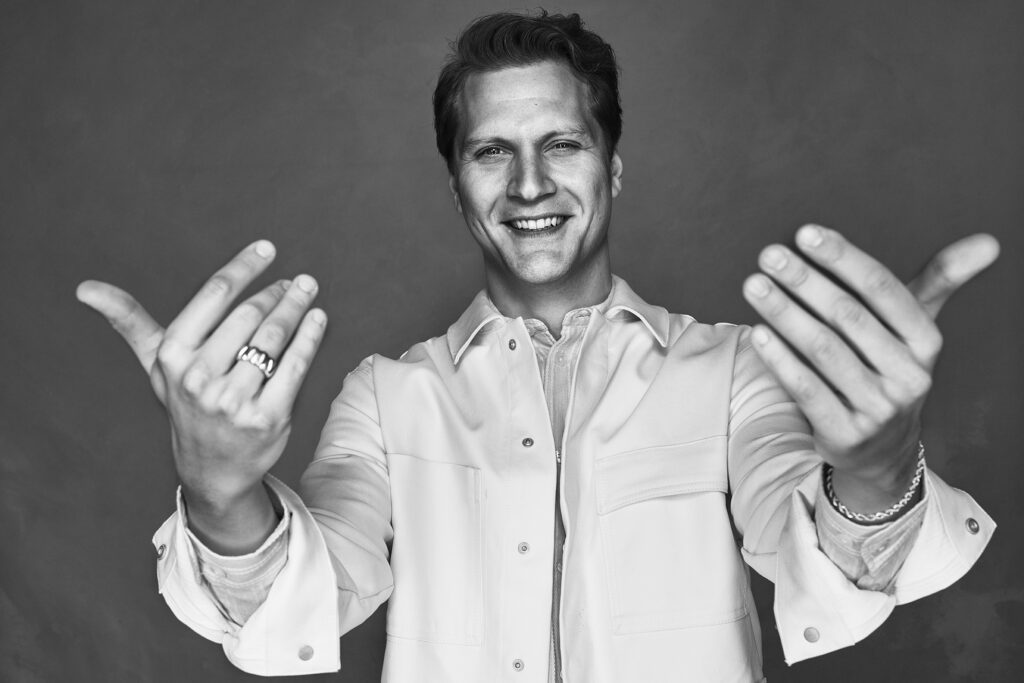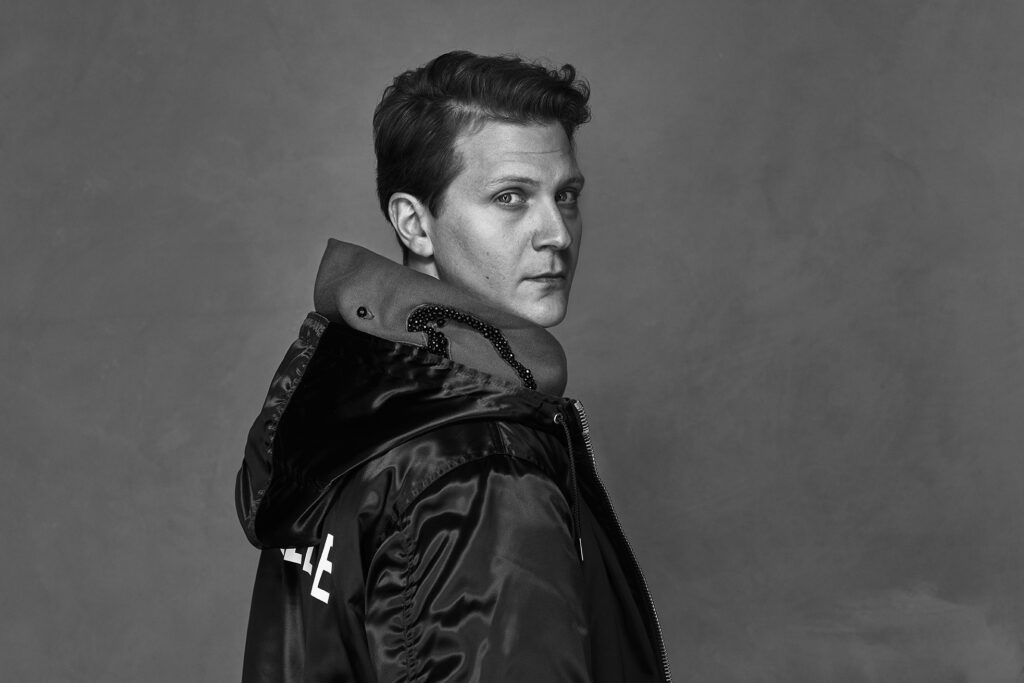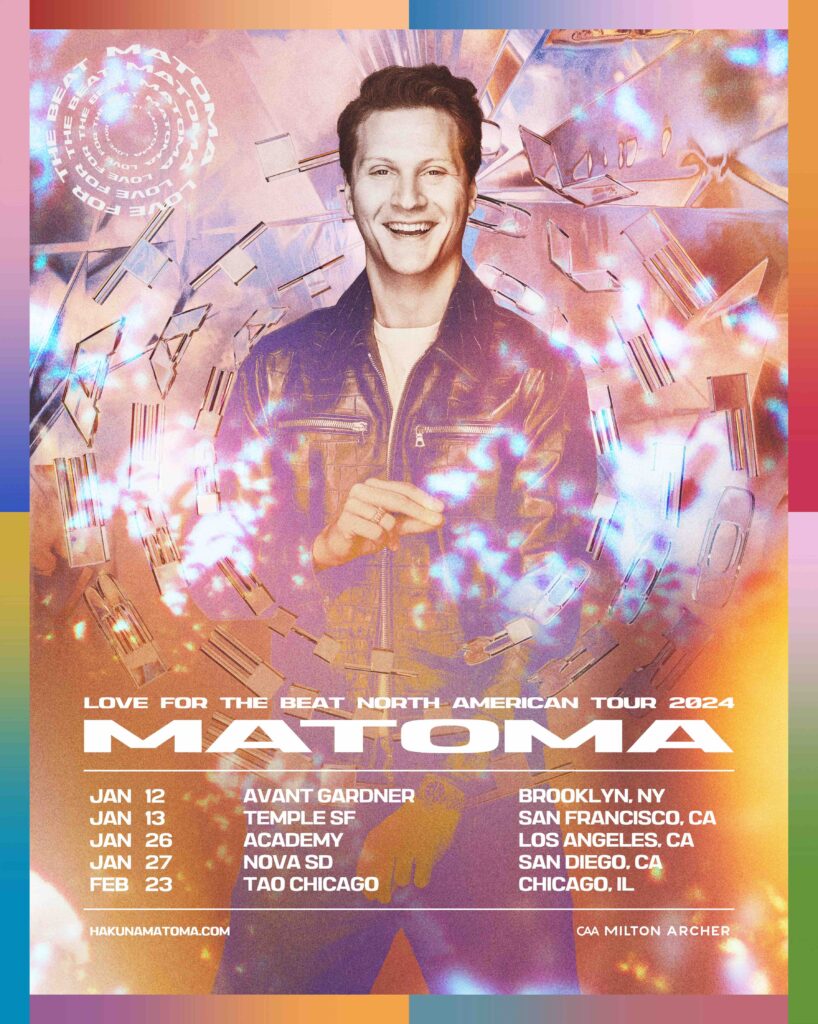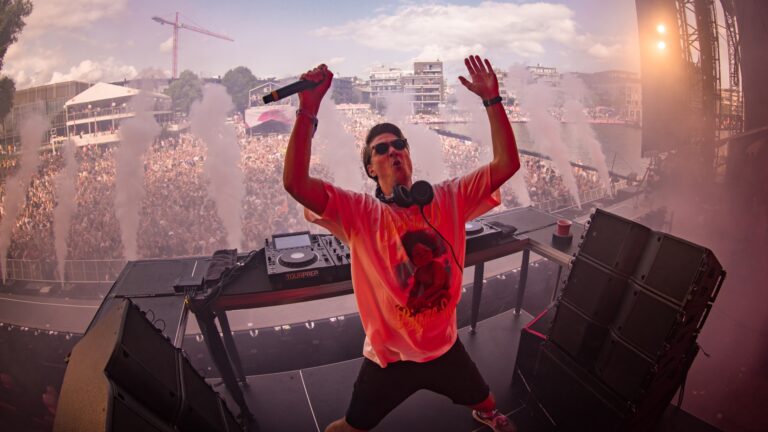DJ LIFE catches up with Matoma about album number 3, how his music has matured & his interests have broadened.

After nearly 10 years on the music scene, Matoma has cemented himself as one of the leading names within the electronic-music circuit. Born Tom Lagergren in Åsnes, Norway, Matoma has delivered some of the biggest tunes in dance music, both as a solo act or collaborator with top-level talent, and 2024 promises even more big doings.
Exploding onto the scene in 2014, Matoma first garnered mainstream success with “Old Thing Back,” his remix of The Notorious B.I.G.’s posthumously produced “Want That Old Thing Back” featuring Ja Rule and Ralph Tresvant. Credited on the track as an artist along with the late, great Brooklyn MC, Matoma saw this trop-house/hip-hop track, his very first single, achieve RIAA Platinum-certified status. The hit also was featured on his 2015 debut album, Hakuna Matoma. (2015).
Since then, Matoma has continued to make waves with his original music with hits like 2017’s “Party on the West Coast” with Faith Evans and The Notorious B.I.G. feat. Snoop Doggs, but also with remixes (for acts like Coldplay, One Direction, and Clean Bandit) and collaborations with powerhouses such as Dua Lipa, Jennifer Lopez, and Jason Derulo.
In 2018, Matoma’s hot streak continued with the release of his second album, One In A Million. The 15-cut effort has gone on to receive over 2 billion streams worldwide, with over a billion coming from his massive hit singles “False Alarm” (with Becky Hill), “Lonely” (feat. MAX), “Slow” (feat. Noah Cyrus), and “All Night” (with The Vamps).
Now, five years later, he’s just released his third full-length, Love For The Beat, which signifies a matured sound and an evolving artist. The 10-track LP saw its official drop this past November and includes contributions from the likes of BullySongs, Armin van Buuren, HARLEE, JP Cooper, and James Droll, among others. When it came time to create Love For The Beat, Matoma says he “wanted to try to take meaningful life stories from the storytelling and put that into [his] songs. All the songs on the album have a meaningful story to be told.”
He’s classically trained with an impressive ear for the technical, but it’s Matoma’s passion for music and love of the art that truly elevate his creativity and ignites the spark within. The 32-year-old talent is a DJ, producer, songwriter, and instrumentalist, with noteworthy skills and interests that go beyond the realm of music. A philanthropist in his native Norway and a co-founder of the AI mastering service company, Masterchannel, Matoma certainly wants to leave a legacy through his music—but hopes to also be known for so much more than that.
DJ LIFE recently sat down with Matoma, as he had a short break from touring.

DJ LIFE: How and when did you begin exploring dance music? Who were your early musical inspirations?
Matoma: That’s a fun question. My brother was actually the person who introduced me to dance music and that was at a very early age. I think I was about 5- or 6-years old, and he was probably 10. He came home with a cassette and cassette player. He had trance songs on it, and I remember hearing the melodies. Back then, trance was very heavily coming out of Central Europe – The Netherlands, Belgium. And one thing that they have that’s amazing are roots to these Nordic and Scandinavian heritages. I think without them even knowing about it, their melodies are very much inspired by Nordic melodies. In trance, especially, there are so many chord progressions and ways that you compose the music that are similar to classical Norwegian romantic music. I think that’s why, for me, of all the different genres – techno, house, deep house, all of the genres – I think trance spoke the most to me.
DJ LIFE: The melodies grabbed you…
Matoma: It was because of the melodies and how it sort of portrayed this landscape of Scandinavian scenes. I could see myself skiing down a mountain, having the goggles on, going really fast. I wasn’t dreaming about becoming a DJ or producer – I actually used the music to elevate my nature experiences. In the early days, before Tiësto became more mainstream, he was releasing really dope trance records.
DJ LIFE: Trance is still bigger than ever.
Matoma: Even looking at what’s going on right now within dance music, there are so many elements from trance. I was actually telling Andrew [Jackson], my manager, about this five years ago: I do really think these trance elements – the really big ’90s and 2000s trance tracks with hard drops – are what’s going to be playing in the clubs. And what are we seeing right now? Trance that is dominating the mainstream. To me, it’s so fun because I love trance and I’ve always been drawn to the genre. I don’t know how I ended up making tropical house in the beginning, and not trance [laughs]. Trance is really what I grew up on.
DJ LIFE: That being said, did trance inspire any of the tracks or sounds on your new album?
Matoma: Oh, yeah! When it came to tracks like “Bittersweet” and “Sodium Sky,” and records like “Break My Own Heart,” it was important to me to bring in these elements. First of all, having that connection is also so important to me, that from the moment you put those headphones on, you get an experience. Whether it’s bad or it’s good – I don’t care. It’s just important for me to have listeners feel like, “Wow, sonically, I’ve never heard anything like this before.” If I can’t make you think, “Oh wow, this is interesting – what was that sound? How did he do that?” If I can’t do that with my music, then I feel very little fulfillment. When I get messages from my fans on Instagram that say, “Oh wow, how did you make that, Tom?” To me, that is the most rewarding thing about music, when people appreciate my art.
DJ LIFE: That’s saying a lot.
Matoma: I don’t care if I have 6 million or 8 million monthly listeners [on Spotify]. Of course, it helps to have 8 million, but I’d rather have 6 million and stay true to my identity and true to my art. I can go elsewhere to make money, and probably so much more easily than I do by making music. So, why when I’m spending so much time on trying to make people dance, why am I trying to please somebody I haven’t met? It’s so much more rewarding to please somebody that I’ve met at my concert, where they’ve said to me, “Oh, ‘False Alarm’ represents an era!” Or “I met my husband or wife to your music.” When people tell me things like that, I get filled with hope. I get filled with love. So, over the years, when people have asked me what inspires and motivates me, it always comes down to two things: Human beings and the connection between me and my audience, and secondly, traveling, seeing nature, and experiencing and exploring cultures.
DJ LIFE: Global DJs certainly have a unique job.
Matoma: You might not know this, but Vikings back in the day, 4,000 years ago, actually didn’t go around plundering the world. We were tradesmen. I kind of see how being a musician is like a trade. You travel the world, you show people your culture and your flavors, and then they go and introduce their flavors to you. That is how you become inspired. That is how you enhance your life in a positive way and also makes you become more creative.
DJ LIFE: What made you choose the name Matoma?
Matoma: It was my brother who came up with the name. Before Matoma, I was actually called Sub Hero. When I was in the army, I became friends with a guy who was a designer, and he designed a logo for Sub Hero. I paid him like $1,000 for the logo and I was so proud of that name. During an afterparty, my brother came up to me and said, “Tom, you’re starting to make really good music, but this Sub Hero name… we have to talk about this. It sounds like a cartoon name.” I had so much pride – and because I had spent so much money on the logo, we started having this argument. Then, this one friend that lived with me and my brother came between us and said, “Tom and Dan, can’t you take life easy? You always have to fight. Be more like Timon and Pumba from the Lion King… Hakuna Matata.” My brother was so drunk and all over the place that he said, “Hakuna Matoma!” I thought, “MATOMA! That is fucking dope!” The next day when we woke up hungover, we went downstairs to the living room and the night before we had written “MATOMA” on the whole table. Seven months later, I was signed to Atlantic Records.
DJ LIFE: At that time, what was your DJ set-up?
Matoma: I was DJing on some crappy MIDI equipment. I had absolutely no idea. I’m classically trained, and my craft is in piano. I started playing piano when I was 7-years old, and I wanted to become a classical pianist. So DJing did not even begin for me as a hobby until I was about 17-years old. It was when my friends started having parties and they needed a DJ, so I was always down to do it. I took it quite seriously because I got my dad to lend me money so I could buy DJ equipment and speakers. I was throwing private parties and charging people to come. I even had some in my basement! After about six months, I had enough money to pay my dad off. I was able to sell it all, buy a good laptop, so that I could really start producing. This was when I was 17- or 18-years old and I started saving all the money I would make to invest into better equipment, controllers, PC, and eventually Pioneer DJ CDJs, once I could afford it.
DJ LIFE: How about your current DJ set-up?
Matoma: My current DJ setup is the Pioneer CDJ-3000 and the latest Pioneer mixer, DJM-A9. For me, sound is the most important thing, so my monitors have to be the best. Besides that, it’s not too much hocus pocus. It’s not too much of MIDI controllers or the extra stuff. My sets are very much “power mixing” because I like to switch up the tempo and switch up the vibe. I usually don’t do three- four song mixing in one transition, so there’s no need for me to have all the extra technical equipment. What I do sometimes is bring a band. For example, in 2019 in Norway, I had “Matoma Live,” where there were five others. We brought in live singers and guest performances. I do really like to implement my passion for live music into my sets as well.
DJ LIFE: What are your production and studio preferences? Have these changed over time?
Matoma: Over the years, I’ve gradually updated by database of sounds, plug-ins, and software. I’ve spent about $60,000 just on softsynths – and that’s not even including the audio plug-ins. It’s actually quite funny because I also make my own sounds, which I learned when I took my Bachelor’s Degree in music technology and production. I do really invest my money into music production and equipment. One program that I’ve always used and have not changed is Cubase Pro by Steinberg. During my years in college, I tried out pretty much everything – and if you’re not a live-based sample artist, and you need Ableton to do the sampling and looping, when it comes to traditional production, I would say Cubase gives you the biggest bang for your buck.

DJ LIFE: This past October, you released “Sodium Sky,” the lead single from your new album, with BullySongs. How did that come about?
Matoma: With Bully, I’ve worked with him many, many times. My history with him goes back about five years, at least. Over the years, the opportunity for us to meet and share beautiful experiences have just been amazing. The more we get to know each other, the more we can explore musically. My song, “Take Me to the Sunshine,” is also with BullySongs and a group called SUPER-Hi. They are two new really talented producers down in South London. I’ve made so many great songs with them over the years, so we have a really strong and close relationship. After “Take Me To The Sunshine,” I was texting them asking them to send over songs or an a cappella because I really wanted to build on “Sunshine.” That one was a great story, and a lot of people liked it. Bully sent over the topline, and I got the immediate feeling of an Empire Of The Sun-type vocal. I immediately had this idea to add all of these trance sounds because there was so much room for call-and-response, which is what I tried to do. I played around with the vocal and my sound design in the synths.
DJ LIFE: Your new album, Love For The Beat, came out recently. How long were you working on it and was the process different from your last?
Matoma: The process was quite different because this was an independent process where I’m releasing the album independently, which is a big step for me. I think moving away from the big record deal I had and going into this new independent type of situation, it has been flooring with ideas about where I want to take the music. Last year, I really wanted to make an album where I was able to tell the real-life stories of people, which have kind of disappeared. Now we are just taking old records and mashing them up or making a remake. It’s been a great add-on for the dance culture and the movement, but I feel that between 2010 and 2017 there were some really heavy, great EDM records that changed people’s lives. I wanted to try to take meaningful life stories from the storytelling and put that into my songs. All the songs on the album have a meaningful story to be told.
DJ LIFE: Can you give us some examples?
Matoma: “Won’t Follow You Home,” for example, is about having anxiety that’s following you around everywhere, and the only place that you feel safe is when you’re home. That’s the only place that anxiety can’t take you because, when you’re home, you’re in this safe place.
DJ LIFE: What else?
Matoma: “Sodium Sky” is about being high on life because you feel like you’re constantly overthinking everything. I feel like this is quite relevant in today’s society, where people are overthinking everything. On “Work It Out,” you have a power song about a relationship where a girl finds out that she needs clarity, to work on herself, and needs space. [Collaborator] Bava is such a talented songwriter, and we wrote that song in basically 30 minutes.
DJ LIFE: How do you collaborate with others? How does it impact the quality of the tunes?
Matoma: The reason why I think my songs end up having a more tonal undertone, where you feel the lyrics are a bit more digested and with information to take away from the lyrics, is because whenever I make music with songwriters, I have a process. I like to get to know the songwriters I’m working with before we start the session. Sometimes we’ll talk for hours, and then from there, we make a song. I think that it becomes this really powerful interaction between the people that are in the room making the song. And that’s something I’m really proud about on this album. You can really hear within the songwriters and myself, the trueness in the lyrics.
DJ LIFE: You’re a co-founder of the AI mastering service, Masterchannel. How did that come to life?
Matoma: When Simon [Hestermann] and Christian [Schultz] contacted me about Masterchannel, it was a broad idea, and they had this beta version. I remember when I tested it, I thought, “Holy shit, this is gonna revolutionize the way we look at things like podcasting, spatial audio, regular mastering.” And I’m not talking about the industry because the industry has power. This was a way for all the up-and-coming, bedroom producers, that before this haven’t had the chance to have this really crafted master that emphasizes their sound, but makes it professional and for an affordable cost.
DJ LIFE: What’s the killer app?
Matoma: On the Masterchannel service, you have a master within 30 seconds – it’s unlimited. In most cases, you’d be spending $400, and the process is two weeks. I remember when I was a bedroom producer and my budget was tight, so I wanted to create a tool where it could help those people. Something that could get them the quality they need, as long they have a good mix and solid foundation. If you have a balanced mix, Masterchannel does the rest. And that was my main purpose with this tool because I wanted to take the producer and connect them with this finessing and personal touch. So, for us to really be able to make that as good as possible, and to replicate a human, we’ve spent years – a lot of time – coding.
DJ LIFE: Looking at music production and AI, what do you think some of the greater implications might be?
Matoma: I do believe that there will always be people that are going to take advantage of technology – squeeze every penny out of it. That’s just how it is. But I think the trueness of music and art cannot be taken away from a human being because you need to have a soul for that. What I hope is that you will have tools that can help you lift your art, but that you don’t have a tool that makes the art for you. Masterchannel is a service that will provide you with something that can elevate your song, but it doesn’t make the song for you. You have to make the song yourself; you have to put in every ingredient. My point is that if you have tools to help you reach a bigger audience with your art, then I’m supporting. But if the main reason or purpose is to make money or become famous, then I’m not for it. Because then, you’re taking the most important ingredients and cultural factors away from making music, and that comes from the soul of a human being.
DJ LIFE: You’re also a philanthropist. What got you thinking in that direction?
Matoma: I was very privileged to be growing up in a community where we had enough, but we didn’t have the riches that some communities had. My family came from a working-class family and instilled certain values. My mom worked really hard, and my dad worked really hard, for me and my brother to have the same equal opportunity to do what we wanted to do when that day would come where we wanted to explore. That freedom is not granted for everybody. Even in Norway, with the free healthcare, public schools, affordable transportation, and things that help communities to strive, we still have families and people that are struggling. There are kids that don’t have the opportunity to follow their dreams, and I think that is sad in 2023, where we live in a society where the country is so rich, but you can see the younger generation is suffering from it. They have less cultural activation, and even less social activation because of it.
DJ LIFE: What can you share with us about your philanthropic efforts?
Matoma: Over the last couple of years, it’s been very important for me to go into these local communities, stir around, and inspire these kids to follow their dreams. I have a scholarship grant here in Norway, where I give out scholarships for kids to follow their dreams. This year, together with Mats Zuccarello, the Norwegian hockey player, we hosted an event together with 18 artists that came to perform. I was proud of that, and we raised a lot of money! That is only one of the initiatives I do.
DJ LIFE: What else have you done?
Matoma: I also devote my time to climate-positive initiatives, which I’ve been doing since 2016. I was actually the first artist in the world to contact the United Nations to ask what I could do as an artist to get my footprint down. It’s complicated because people think that you can just pay your way off, but you are appointed people with so much knowledge, and there’s so much good you can do. You can invest money into these things, but you can also use your knowledge, network, and people to influence. I think that’s the beauty of being an artist… really using your platform to do good. Maybe that’s just my roots from my childhood, but I really do feel that in 2023, looking at the world and where we are, we need more people to be responsible. We need more people to use their voice, and we need them everywhere. We need to show humanity, and the only way we can show humanity is by listening to what’s going on in the world – and the world is screaming right now.

Coinciding with the release of his album, Love For The Beat, Matoma is embarking on a tour, beginning in January. In support of the LP, Matoma will be hitting New York City, San Francisco, Los Angeles, San Diego, and Chicago. Find more information and purchase tickets at hakunamatoma.com.


